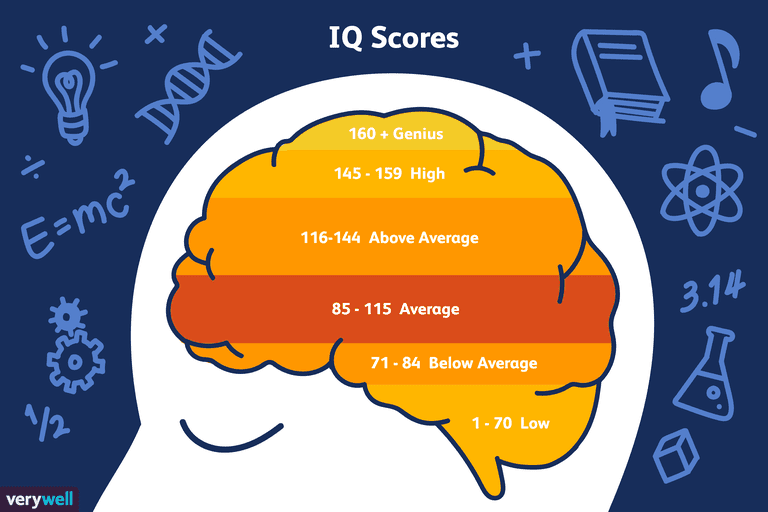We’ve all heard the term “genius” used to describe exceptional individuals—whether it’s Albert Einstein or the child prodigy down the street. But what exactly defines a “genius” when it comes to IQ? What number on the scale is considered genius-level intelligence? Is it really just about the number, or is there more to it? In this article, we’ll dive deep into what makes an IQ score genius-level, explore the factors that contribute to intelligence, and discuss whether an IQ score can truly measure genius.
What Is an IQ Score? A Quick Overview
An IQ score, or Intelligence Quotient score, is a measure of a person’s intellectual abilities relative to the general population. It’s obtained through standardized testing designed to assess various cognitive skills, including logical reasoning, problem-solving, and verbal comprehension. The average IQ is set at 100, with most people scoring somewhere between 85 and 115.
Also Read:
Introvert Personality Type: Characteristics You Should Know
How IQ Scores Are Calculated
IQ tests typically use a series of puzzles, questions, and tasks that measure different aspects of cognitive ability. The results are then compared to a normative group of individuals of the same age, and a score is derived. The tests are designed to have a normal distribution, meaning the majority of scores will fall within a certain range, with fewer people scoring at the extremes.
The Scale of IQ: What Numbers Matter?
IQ scores are typically broken down into ranges that represent different levels of cognitive ability:
- 70–85: Below average intelligence
- 85–115: Average intelligence
- 115–130: Above average intelligence
- 130–145: Highly intelligent
- 145 and above: Genius-level intelligence
While a score of 100 is considered average, the real interest lies in those at the higher end of the scale—particularly the 140+ range, which is typically associated with genius-level intelligence.
What Constitutes a Genius IQ Score?
So, what makes an IQ score “genius-level”? In most cases, an IQ of 140 or higher is widely accepted as genius-level. However, as we’ll discuss later, the number is just one piece of the puzzle. Let’s break down what makes these scores stand out.
The 140 Threshold: Commonly Accepted Genius Range
While there’s no single universally agreed-upon IQ score that defines “genius,” a score of 140 is often cited as the benchmark. This score places individuals in the top 2% of the population, meaning they outperform 98% of others in terms of cognitive ability. The higher the score, the rarer and more extraordinary the individual’s intellectual capabilities.
Beyond the Numbers: Qualities of Genius-Level Intelligence
Genius-level IQs aren’t just about raw cognitive ability. People with high IQs often demonstrate several other traits, such as:
- Advanced Problem-Solving Abilities: Geniuses often excel in recognizing patterns, making connections, and solving complex problems in innovative ways.
- Creative Thinking: Many high-IQ individuals show remarkable creativity in their fields, whether it’s in science, art, or literature.
- Memory and Learning: A quick and efficient ability to retain and recall information is common among individuals with high IQs.
- Abstract Thinking: Geniuses are often able to think in abstract, non-literal ways, which helps them solve problems that others may not even understand.
Are IQ Scores the Only Measure of Genius?
While an IQ score is a widely recognized measure of intellectual ability, it’s important to note that it may not fully capture the breadth of what makes someone a “genius.” Genius is a complex concept that includes more than just problem-solving skills.
Emotional and Creative Intelligence
There’s a growing understanding that emotional intelligence (EQ) and creative intelligence are just as important as cognitive ability. People with high EQ can navigate social interactions, empathize with others, and handle their own emotions effectively, which are key to leadership and personal success. Similarly, creative intelligence allows individuals to think outside the box and innovate, even in areas where IQ tests may not fully capture their abilities.
The Role of Environment and Opportunity
Genius is also shaped by external factors like environment, education, and opportunity. Someone with a high IQ who is exposed to a nurturing environment, rich learning opportunities, and intellectual challenges is more likely to develop their potential and demonstrate their genius. Genius is often the result of a combination of innate ability and the right conditions to foster that ability.
Famous People with Genius-Level IQs
It’s easy to associate high IQ scores with historical figures like Einstein, but there are many examples of individuals whose IQs place them in the “genius” category. Let’s take a look at some of these extraordinary minds.
Albert Einstein and the Myth of IQ
Albert Einstein, often hailed as the archetypal genius, is thought to have had an IQ around 160, although it’s important to note that he never actually took an IQ test. Nonetheless, his groundbreaking contributions to physics have cemented his status as a genius, regardless of the specific number. His ability to think abstractly and challenge existing scientific paradigms was what truly set him apart.
Modern Examples of Genius-Level IQs
In modern times, we see high-IQ individuals like Marilyn vos Savant, who holds the Guinness World Record for the highest recorded IQ at 228, and Christopher Hirata, who had an IQ of 225 and became the youngest American to win a gold medal in physics at the International Olympiad.
Conclusion: Is Genius Really Defined by Numbers?
While an IQ score of 140 or higher is often associated with genius, it’s clear that genius isn’t just about numbers. Emotional intelligence, creativity, and opportunity play a major role in shaping what it means to be truly “genius-level.” Ultimately, genius is a combination of innate ability, the environment, and the drive to push boundaries.


